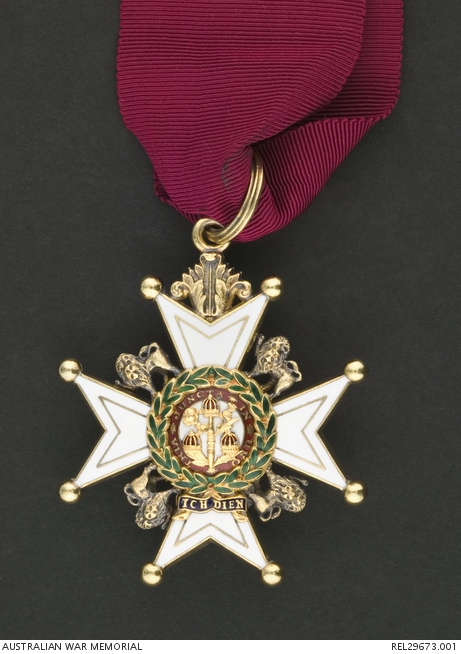| Places | |
|---|---|
| Accession Number | REL29673.001 |
| Collection type | Heraldry |
| Object type | Award |
| Physical description | Silver gilt, Enamel |
| Location | Main Bld: World War 2 Gallery: Gallery 3: New Guinea |
| Maker |
Unknown |
| Place made | United Kingdom |
| Date made | c 1943 |
| Conflict |
Second World War, 1939-1945 |
Companion of the Most Honourable Order of the Bath (Military division) : Major General G A Vasey




Badge of Companion of the Most Honourable Order of the Bath (Military division). Unnamed as issued.
George Alan Vasey, a professional soldier, was born in 1895. He graduated from RMC Duntroon in 1915, and during the First World War served with 4 and 22 Field Artillery Brigades, and as brigade major of 11 Infantry Brigade. At the outbreak of the Second World War, he was posted to the 6th Division in the Middle East. In March 1941 he took command of 19 Infantry Brigade which he led in the fighting through Greece and Crete, also taking overall command of Australian forces involved in the defence of Crete. After returning to Australia in early 1942, Vasey was promoted major general and made deputy Chief of the General Staff. In September, he gained command of the 6th Division, then fighting the Japanese in Papua. Soon afterwards, however, he was transferred to lead the 7th Division through the fighting at Gona, Sanananda, Nadzab, Lae and the Ramu Valley. By mid 1944, his health had deteriorated to such an extent that he was evacuated to Australia, and not expected to survive, but in early 1945 he had recovered sufficiently to be appointed to command of 6 Division. While flying to assume this new command on 5 March, his Hudson aircraft crashed into the sea off Cairns and all on board were killed.
The citation for the award of Companion of the Bath reads, 'Major-General VASEY had highly meritorious service in the Middle East as Commander, 19th Australian Infantry Brigade. Upon his return to AUSTRALIA, he was attached to the General Staff, Home Forces, and later became Deputy Chief of the General Staff. He was subsequently appointed Commander of the 6th Division, A.I.F., and later of the 7th Division, A.I.F., in New Guinea. He took command at a critical moment in the operations in the Owen Stanley Range. Advance was made to the coast by the Australian troops under the most strenuous conditions, in which he shared all privations with the ranks. He showed forceful and inspiring leadership and was one of the outstanding leaders of the campaign.'
- Commander of the Order of the British Empire (Military division) : Major General G A Vasey
- Distinguished Service Order and Bar : Major General G A Vasey
- 1914-15 Star : Lieutenant G A Vasey
- British War Medal 1914-20 : Major G A Vasey
- Victory Medal with MID : Major G A Vasey
- 1939-45 Star : Major General G A Vasey
- Africa Star : Major General G A Vasey
- Pacific Star : Major General G A Vasey
- Defence Medal : Major General G A Vasey
- British War Medal 1939-45 with Mention in Despatches oakleaf: Major General G A Vasey
- Australia Service Medal : Major General G A Vasey
- Greek War Cross 1940, First Class : Major General G A Vasey
- United States Distinguished Service Cross : Major General G A Vasey
- Compressed fibre identity discs: Major General G A Vasey
- Colour patch of Headquarters 7th Australian Division : Major General G A Vasey
Related information
Conflicts
Places
Subjects
Related Objects
- Commander of the Order of the British Empire (Military division) : Major General G A Vasey
- Distinguished Service Order and Bar : Major General G A Vasey
- 1914-15 Star : Lieutenant G A Vasey
- British War Medal 1914-20 : Major G A Vasey
- Victory Medal with MID : Major G A Vasey
- 1939-45 Star : Major General G A Vasey
- Africa Star : Major General G A Vasey
- Pacific Star : Major General G A Vasey
- Defence Medal : Major General G A Vasey
- British War Medal 1939-45 with Mention in Despatches oakleaf: Major General G A Vasey